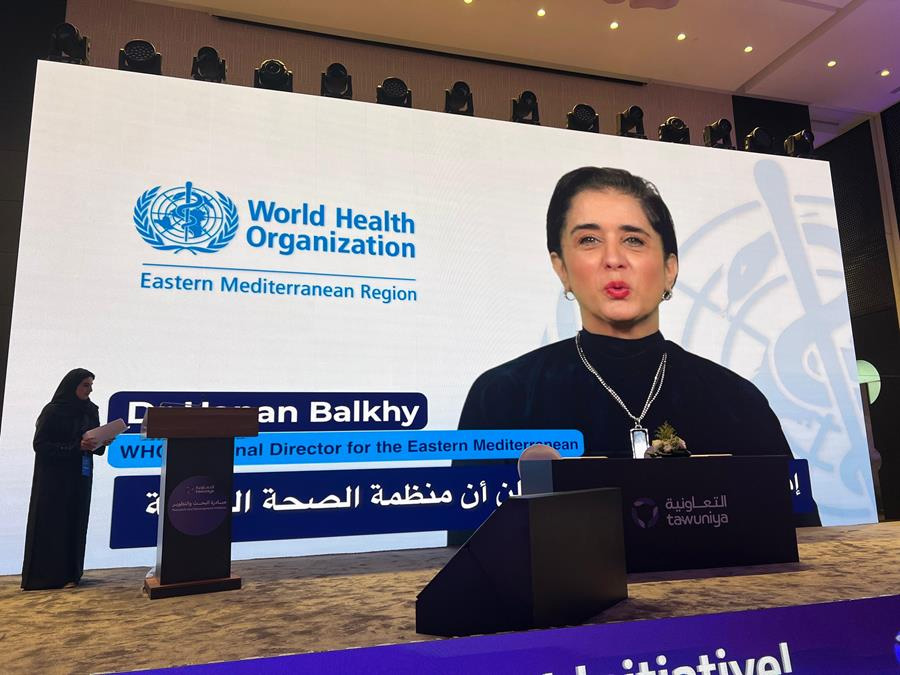 Riyadh, Kingdom of Saudi Arabia – 19 May 2025 – The WHO Foundation has signed a strategic Memorandum of Understanding (MoU) with Tawuniya, Saudi Arabia’s largest insurance provider, marking its first-ever corporate partnership in the Gulf Cooperation Council (GCC) region. This milestone agreement establishes a framework for advancing regional health priorities in alignment with the World Health Organization’s mission.
Riyadh, Kingdom of Saudi Arabia – 19 May 2025 – The WHO Foundation has signed a strategic Memorandum of Understanding (MoU) with Tawuniya, Saudi Arabia’s largest insurance provider, marking its first-ever corporate partnership in the Gulf Cooperation Council (GCC) region. This milestone agreement establishes a framework for advancing regional health priorities in alignment with the World Health Organization’s mission.
The MoU was signed at a high-level event in Riyadh, held during Tawuniya’s Research and Development Forum and attended by more than 100 invited guests. Dr. Othman Alkassabi, Group CEO of Tawuniya, and Dr. Hadi Al Enazy, Senior Executive Director, Health Transformation and Governance, signed on behalf of Tawuniya. Anil Soni, CEO of the WHO Foundation, joined virtually from Geneva, while Reem Abdelhamid, Regional Director for the Middle East and North Africa region, signed on behalf of the WHO Foundation in person.
“This agreement isn’t just a first for the WHO Foundation in the Gulf, it’s a new kind of partnership for public health. With Tawuniya and MEENA Health, we are building a platform rooted in innovation, equity, and shared purpose. Together, we’re helping to shape the future of how health systems are strengthened and sustained across the region through digital health, local leadership, and smart collaboration.”
— Anil Soni, CEO of the WHO Foundation
"Today marks a pivotal moment as Tawuniya joins forces with the WHO to launch our Research and Development Centre. Together, we commit to driving innovation and digital transformation in healthcare, advancing value-based care, and empowering population health management. Through this partnership with WHO, powered by WHO Foundation, we also aim to improve access and affordability, ensuring better outcomes for all."
— Dr. Othman Alkassabi, Tawuniya CEO
The signing of the MoU sets the stage for a longer-term partnership to advance regional health priorities. While specific programs will be defined in consultation with the WHO Eastern Mediterranean Regional Office (EMRO), the areas under consideration include strengthening digital health systems, enhancing access to quality primary care, advancing mental and occupational health, and exploring population health management models rooted in local innovation.
“On the eve of the 78th World Health Assembly, we celebrate a pioneering framework for mutual cooperation between the WHO Foundation and Tawuniya and MEENA. At a time when global health challenges are growing more complex, this collaboration reflects a bold, forward-looking vision that sees partnership as a catalyst for transformative change—from the region, for the region.” Thank you, Tawuniya and MEENA Health, for embracing our vision of equitable access to healthcare for all.”
— Dr. Hanan Balkhy, WHO Regional Director for the Eastern Mediterranean
The collaboration may also help inform efforts to rebuild health systems in crisis-affected areas such as Syria and Sudan, where regional expertise and targeted innovation can have life-saving impact. As priorities are refined with guidance from WHO EMRO, the partnership could support the use of artificial intelligence, digital platforms, and evidence-based strategies to improve care delivery in some of the most underserved environments.
Concrete deliverables are expected to be further shaped by the WHO Regional Committee Meeting in Cairo in October 2025.
About the WHO Foundation
The WHO Foundation, headquartered in Geneva, Switzerland, is an independent grant-making organization that supports the mission of the World Health Organization. It mobilizes philanthropic capital and builds catalytic partnerships to address the world’s most pressing health challenges, especially for vulnerable communities.
About Tawuniya
Tawuniya, established in 1986, is the Kingdom of Saudi Arabia’s first and largest insurance provider. With a valuation of SAR 20 billion and over 3.5 million members, Tawuniya is leading health system transformation in the Kingdom through prevention, digital tools, and community-based models of care.
About WHO EMRO
The World Health Organization Regional Office for the Eastern Mediterranean (WHO EMRO) supports 22 countries and territories across the Middle East, North Africa, the Horn of Africa, and Central Asia. Working closely with national governments and partners, WHO EMRO provides technical guidance, emergency response, and long-term health system strengthening to improve the health and well-being of nearly 700 million people. Headquartered in Cairo, WHO EMRO plays a leading role in addressing regional health priorities including noncommunicable diseases, maternal and child health, infectious disease control, and health system resilience.
Media Contact
Carolyn Davenport-Moncel
c.davenport-moncel@who.foundation
+41 79 198 89 42





